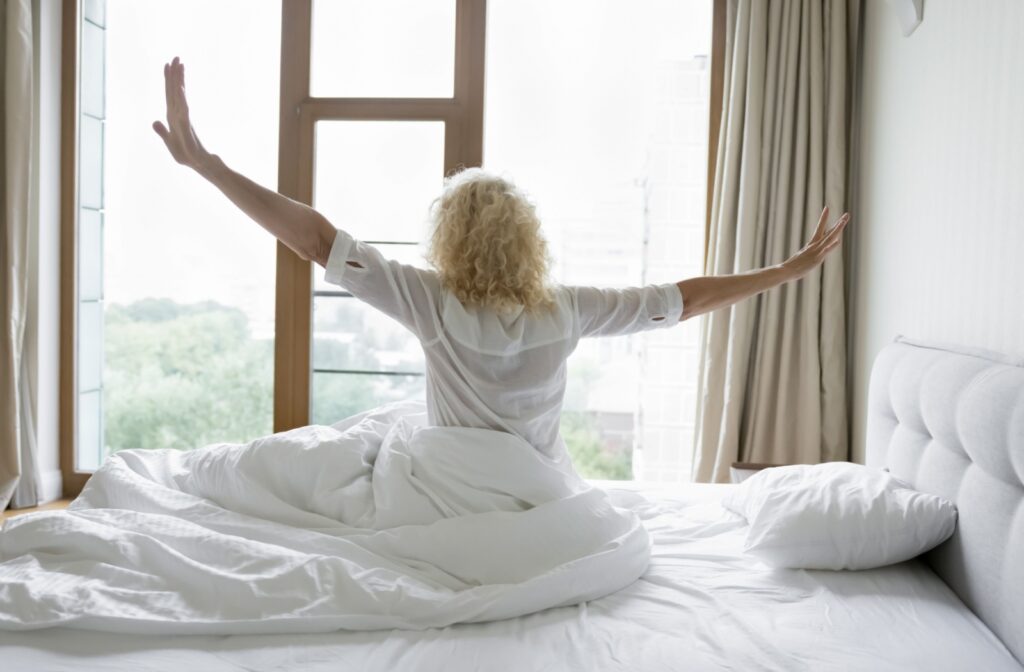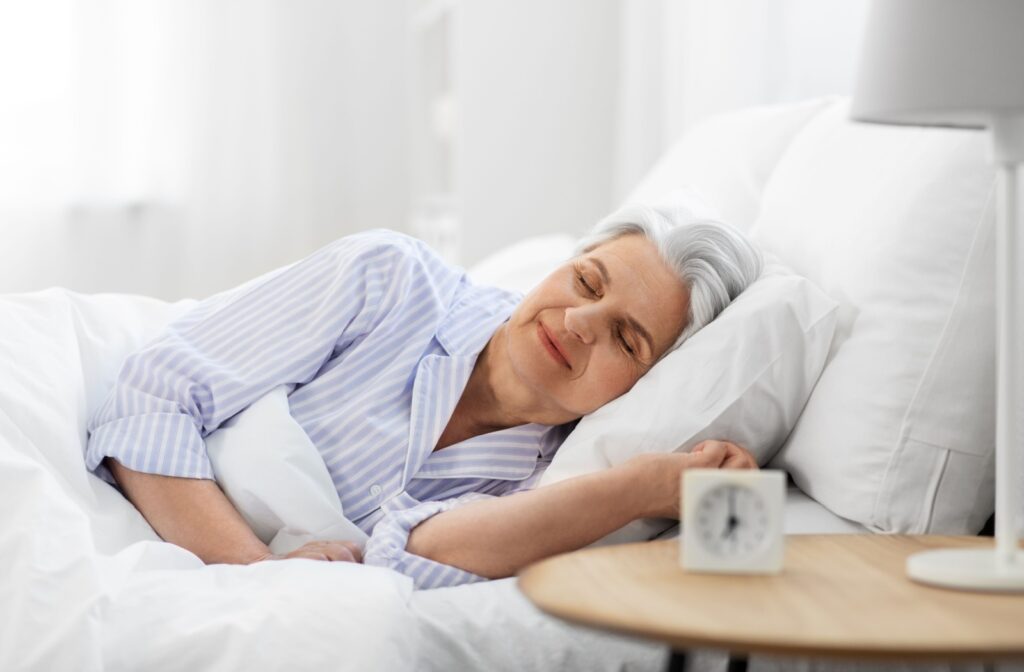Getting quality sleep is vital for seniors to maintain their overall health and well-being. Sleep supports physical health, cognitive function, and emotional stability, making it a crucial factor in aging gracefully. Seniors can improve their sleep by maintaining a consistent routine, creating a comfortable sleep environment, staying active, managing stress, limiting naps, and monitoring food and drink.
However, many older adults face challenges when it comes to achieving restful sleep. Understanding these challenges and learning ways to improve sleep can significantly enhance the quality of life for seniors.
Why Is Sleep So Important for Seniors?
Sleep plays a crucial role in maintaining various aspects of health, and its importance becomes even more pronounced as we age. Proper sleep offers several key benefits for seniors:
- Cognitive health: Sleep helps consolidate memories and supports brain function. Poor sleep has been linked to an increased risk of cognitive decline and dementia.
- Emotional stability: Consistent sleep can reduce feelings of anxiety and depression, contributing to a more positive outlook on life.
- Physical well-being: Sleep supports the immune system, aids in tissue repair, and reduces the risk of chronic conditions like heart disease and diabetes.
As we age, our sleep patterns naturally change, but this does not mean that sleep should be neglected. Prioritizing good sleep hygiene can make a significant difference in seniors’ daily lives.
Common Sleep Challenges for Older Adults
Seniors often encounter various obstacles that can interfere with their ability to achieve restful sleep:
Changes in Sleep Patterns
As people age, their sleep tends to become lighter, and they may wake up more frequently throughout the night. These shifts can lead to feeling less rested in the morning. Additionally, older adults often experience a shift in their circadian rhythm, causing them to feel sleepy earlier in the evening and wake up earlier in the morning.
While these changes are natural, they can disrupt social schedules and contribute to feelings of fatigue.
Health Conditions & Medications
Chronic pain, arthritis, respiratory issues, and conditions like sleep apnea can disrupt sleep. Additionally, certain medications can interfere with the ability to fall or stay asleep. Seniors are more likely to take multiple medications, increasing the likelihood of side effects that affect sleep. Consulting a healthcare provider to review medications and address any underlying health concerns can help alleviate sleep disruptions.
Increased Daytime Napping
While napping can be beneficial, excessive daytime sleep can reduce the body’s need for sleep at night, leading to difficulties falling asleep. Short naps of 20 to 30 minutes can enhance alertness and energy without interfering with nighttime sleep. However, long or irregular naps, especially later in the day, can confuse the body’s internal clock and hinder the ability to fall asleep at night.
Stress & Anxiety
Concerns about health, finances, or life changes can lead to heightened stress levels, making it harder to relax and fall asleep. Additionally, feelings of loneliness or grief can contribute to emotional distress, further exacerbating sleep difficulties. Practicing stress management techniques and seeking emotional support when needed can alleviate these concerns and promote better sleep.

Practical Tips to Improve Sleep Quality
While sleep challenges are common among seniors, there are practical steps that can lead to better rest:
Establish a Consistent Sleep Routine
Going to bed and waking up at the same time every day helps regulate the body’s internal clock, making it easier to fall asleep and wake up feeling refreshed. Consistency reinforces the body’s sleep-wake cycle, even on weekends or holidays. Developing a calming pre-sleep routine, such as reading or listening to soothing music, can also signal to the body that it’s time to wind down.
Create a Comfortable Sleep Environment
- Keep the bedroom cool, dark, and quiet. Consider blackout curtains, earplugs, or a white noise machine to reduce disturbances.
- Invest in a supportive mattress and pillows. A mattress that alleviates pressure points can help reduce discomfort from arthritis or other pain conditions.
- Limit the use of screens before bed, as blue light can interfere with melatonin production. Consider using warm lighting and engaging in non-screen activities before sleep.
Stay Physically Active
Engaging in regular physical activity can improve sleep quality. Light exercises like walking or stretching during the day can help promote better rest at night. Exercise reduces symptoms of insomnia and promotes deeper sleep, but it’s best to avoid vigorous activities close to bedtime, as they may have a stimulating effect.
Monitor Food & Drink
- Avoid large meals, caffeine, and alcohol close to bedtime. Heavy or spicy meals can cause discomfort and indigestion, while caffeine and alcohol can interfere with sleep cycles.
- Opt for a light snack if hunger strikes before sleep. Foods rich in tryptophan, such as bananas, yogurt, or nuts, can promote the production of sleep-inducing serotonin.
Manage Stress
Practicing relaxation techniques such as deep breathing, meditation, or gentle yoga can help reduce stress and prepare the mind and body for sleep. Journaling or speaking with a trusted friend can also provide an outlet for worries and prevent racing thoughts when trying to fall asleep.
Limit Daytime Naps
While short naps can be beneficial, keeping them under 30 minutes and avoiding late afternoon naps can prevent nighttime sleep disruptions. Napping earlier in the day, preferably before 3 p.m., is less likely to interfere with nighttime rest.
When to Seek Professional Help
Sometimes, sleep difficulties persist despite making lifestyle changes. If sleep issues continue, it may be necessary to consult a healthcare provider. Sleep disorders such as insomnia or sleep apnea can significantly impact health and may require medical intervention.
Treatment options may include cognitive behavioral therapy for insomnia (CBT-I), medical devices like continuous positive airway pressure (CPAP) machines, or adjustments to medications.
How Senior Living Communities Can Support Better Sleep
Senior living communities are designed to support residents’ well-being, including their sleep health. These communities provide:
- Safe and comfortable living spaces conducive to relaxation.
- Scheduled activities that promote physical and social engagement.
- Nutritious meals served at regular times to support overall health.
- Personalized care to address individual health concerns and improve sleep quality.
At The Lodge at Truitt Homestead, we know that quality sleep is the foundation of good health and overall well-being, especially for seniors. That’s why our independent living community is designed to promote not only better sleep but a healthier lifestyle overall.
Through our wellness partnership with Beebe Healthcare, residents have access to health services that support long-term independence. Daily opportunities for exercise, nutritious chef-prepared meals, and relaxing spaces like our pool and spa all contribute to a balanced routine that encourages better rest. We also foster a vibrant social atmosphere, helping residents stay active and engaged—key factors in improving both sleep and quality of life.
At The Lodge at Truitt Homestead, your health and happiness are our top priorities. Book a visit today to explore our community and discover how we can help you enjoy more restful nights and fulfilling days.





